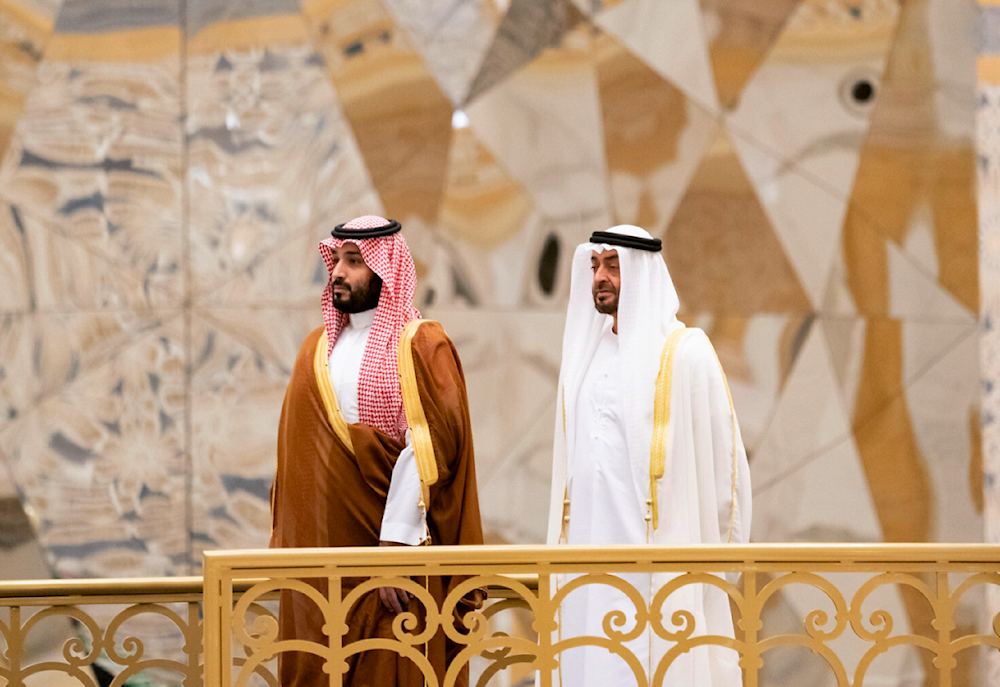Saudi Arabia, UAE, others officially join BRICS
Analysts say the joining of the two massive economies will increase the group's global influence.
-

Saudi Crown Prince Mohammed bin Salman during a ceremony with Abu Dhabi Crown Prince Mohammed bin Zayed Al Nahyan at Qasr Al Watan in Abu Dhabi, UAE on November 27, 2019 (AP)
According to The National, Saudi Arabia, the United Arab Emirates, Egypt, Iran, and Ethiopia officially joined BRICS on January 1, bringing the group's membership to ten, with Brazil, Russia, India, China, and South Africa as founding members.
Analysts believe that the BRICS bloc's expansion to include Saudi Arabia and the UAE will provide fresh investment possibilities for the Arab world's two largest economies while increasing the group's global influence.
Ullas Rao, assistant professor of finance at Edinburgh Business School of Heriot-Watt University in Dubai, expressed that both Saudi and the UAE are some of the richest countries per capita and "home to the biggest sovereign wealth funds," which "augurs extremely well amid ongoing geopolitical and economic challenges confronting the world economy."
According to the International Monetary Fund, Saudi Arabia's GDP will increase by 0.8% in 2023 after growing by 8.7% in 2022, the fastest annual growth rate among the world's 20 largest economies.
A recent World Bank report showed the UAE's economy is expected to grow by 3.4% in 2023, with oil GDP growth projected at 0.7% and non-oil GDP growth projected at 4.5 percent, fueled by strong performance in tourism, real estate, construction, transportation, manufacturing, and a surge in capital expenditure.
Read more: Iran to work on dedollarization of transactions within BRICS: Tehran
The UAE is also establishing trade agreements to boost connections with neighboring countries and is trying to negotiate 26 comprehensive economic cooperation agreements.
Gary Dugan, chief investment officer at Dalma Capital, stated that whereas BRICS had the image of a "financially vulnerable group," the power of the Kingdom and the UAE “as net exporters of capital to the rest of the world will substantially change that perception."
“Also as a collective, we expect Saudi Arabia and the UAE to be afforded easier access to the growth markets of the BRICS countries on favorable terms.”
Ehsan Khoman, head of ESG, commodities and emerging markets research at MUFG, believes the two nations will "reinforce their bargaining power and influence in Opec+ while also offering the space for them to align their strategies with other BRICS members."
China and India, two crucial BRICS members, are the world's second and third largest consumers of oil, with substantial energy links to the Gulf nations, and more bilateral commerce in local currencies is likely according to Carla Slim of Standard Chartered Bank.
As BRICS grows, so will dedollarization
Last year, the UAE and India agreed to develop a framework to encourage the use of local currencies in cross-border transactions and to strengthen cooperation in interconnecting their payment and messaging systems.
Following the agreement, India began purchasing UAE oil in Indian rupees in order to increase bilateral commerce.
As BRICS expands, so will the alternatives to the US dollar, according to Rao.
“As the world navigates for an alternative to the US dollar, even if less relevant today, the emergence of Brics common currency can act as a major harbinger in diversifying risks away from the stronghold of the dollar,” he stated.
Ayham Kamel, head of Mena at Eurasia Group, expressed that new mechanisms forged by BRICS will also "force a degree of political cooperation" by members.
“The Arab countries are looking for improving their global geopolitical influence and appear committed to avoiding detachment from the West.”

 4 Min Read
4 Min Read








